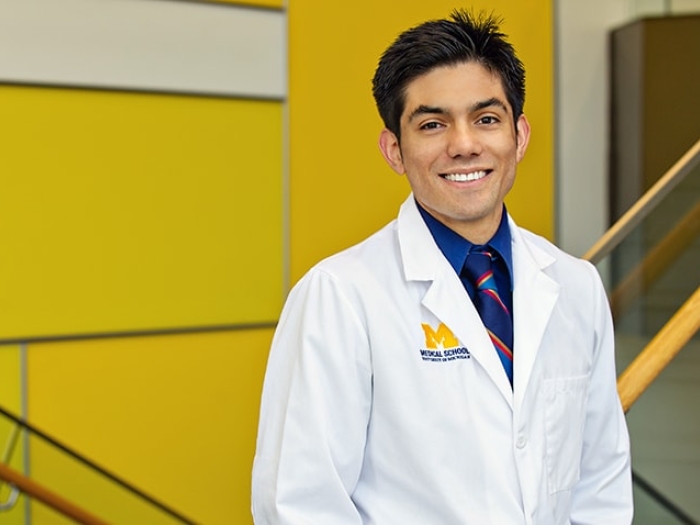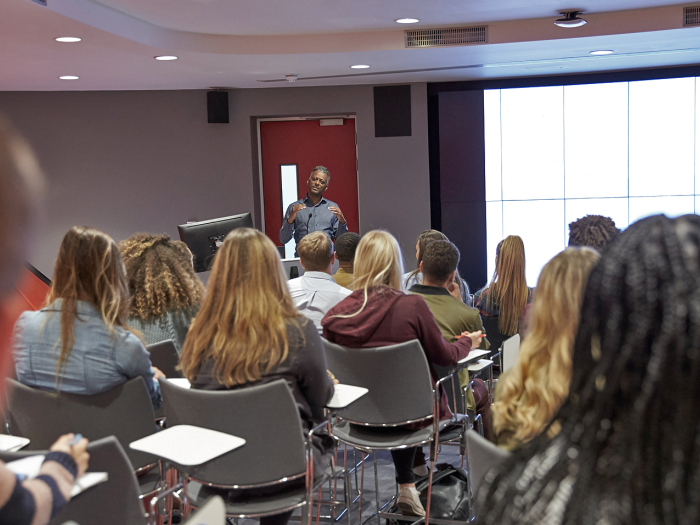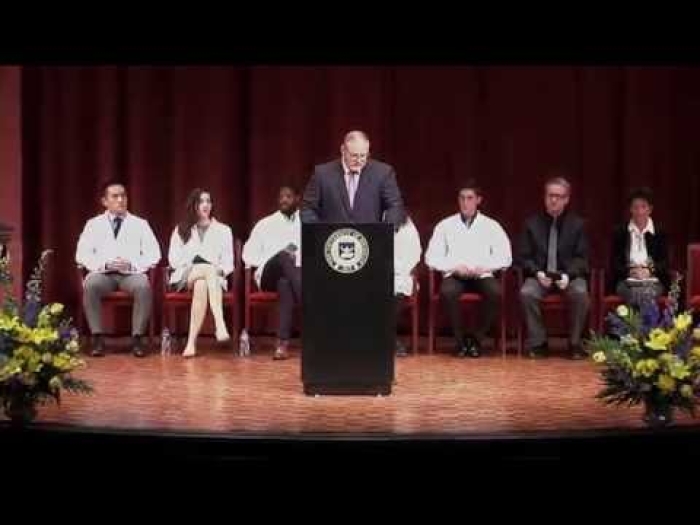It's a road far less traveled, but some Medical Scientist Training Program students find a perfect match outside the biomedical box with social sciences and humanities instead.
5:00 AM
Author |

When Josh Greenberg was an undergrad, he worked on a project that would eventually become a non-profit organization he co-founded in Uganda called Progressive Health Partnership.
During a gap year after graduation, Greenberg decided to apply to MD/PhD programs. There, students can earn an M.D. and Ph.D. in about seven to eight years. According to the Association of American Medical Colleges, there are 125 medical schools in the United States that offer MD/PhDs, but only 50 programs receive National Institutes of Health funding and designation as Medical Scientist Training Programs.
Finding a university where Greenberg could combine a M.D. with a Ph.D. in economics, while still connecting to his work overseas, was a tall order, especially because not all programs offer a Ph.D. in social sciences and humanities.
"Progressive Health Partnership is a very big part of my life, my career and my goals, and it was something that I was intent on continuing with through medical and graduate school. I wanted to be at a university that would hopefully give me a supportive environment to do that as best as possible," says Greenberg.
No universal definition for "non-traditional" Ph.D. programs
For Ronald J. Koenig, M.D., Ph.D., the director of the University of Michigan Medical Scientist Training Program since 1995, a non-traditional training program simply means including Ph.D. programs that aren't traditionally found within medical schools.
There can be some overlap with social science fields and the types of research questions and tools found in typical medical school Ph.D. programs. Psychology and engineering are prime examples: some programs would categorize these fields as non-traditional while others wouldn't.
Koenig adds that the value of having non-traditional Ph.D. options goes both ways: the student gets the flexibility to pursue exactly what they want to study while their diverse interests enrich the program.
SEE ALSO: Undocumented Care: How One Medical Student Is Leading the Immigration Conversation
"We value the intellectual diversity, and we believe these MSTP graduates will make important and unique contributions to medicine and society," Koenig explains.
Before heading down the non-traditional training path, MSTP students at Michigan Medicine suggest asking yourself the following three questions first:
1. Why is an MD/PhD the right choice for me and my career goals?
Before you apply to become an MSTP student, clarify what exactly it is you're looking for in the training process vs. what only pursuing a Master's degree or a medical degree might offer you.
For Lauren Mancia, who's a current MSTP student at U-M, continuing her undergrad research in focused ultrasound therapies was her priority, so she only expected to pursue a Ph.D. degree in mechanical engineering.
It wasn't until starting graduate school that Mancia saw she could combine her research with clinical applications, which led her to apply to medical school, too. "I thought it would be ideal if I could apply my research on this new technology of focused ultrasound to directly help patients in a clinical setting," says Mancia.
For Greenberg, also a current MSTP student, he didn't want a "traditional" career: "It's a dream come true to be able to combine all these degrees together. My thesis project is a mini version of my ultimate vision for what I want to do here in Uganda."
LISTEN UP: Add the new Michigan Medicine News Break to your Alexa-enabled device, or subscribe to our daily updates on iTunes, Google Play and Stitcher.
As for Katie Wataha, another MSTP student now studying the history of science, medicine and technology at Michigan, she couldn't make up her mind between her two passions. "I was so indecisive that I applied to both medical schools and graduate schools separately, and I told myself that I would just have to choose one if I was lucky enough to receive multiple admissions."
A serendipitous conversation with Koenig convinced Wataha to apply for the dual degree.
And for Shai Madjar, another student who earned his Ph.D. in philosophy last year and is now completing the final two years of his M.D., it was about taking more time to develop knowledge. "For me, the Ph.D., compared to no degree or a Master's, gives you a much deeper set of tools for answering questions that lie at the foundation of more applied issues."
2. Are non-traditional Ph.D. options offered at my institution?
Much like a secret menu item at your favorite restaurant, you may not know about a Ph.D. option in a non-traditional field until you inquire. It's important to reach out to individual programs and explore what's possible.
Another MSTP student, Elliott Brannon, had no idea his field existed before he arrived at Michigan Medicine as a medical student.
"When I got here, I talked with professors in the School of Public Health and School of Information before I found my current Ph.D. program in the Department of Learning Health Sciences. I ended up doing a summer project with the person who eventually became my mentor."
SEE ALSO: U-M's SecondLook Apps Help Medical Students Succeed
Madjar learned about the non-traditional MSTP option during his medical school interview at Michigan.
"One of the medical student tour guides was an MD/PhD student in history. I didn't really fully appreciate that you could do a combined MD/PhD in humanities, or that it was even a possibility, until then."
3. Will my research mentor support my medical training and vice versa?
Pursuing a non-traditional Ph.D. may mean you are one of the first students, or even the very first, to do so at your institution. Make sure that you look for a supportive program on both sides of the M.D. and Ph.D. degrees.
"I would not have been able to do this unique thing if it weren't for flexibility in both the mechanical engineering department and the MSTP here," says Mancia.
Wataha adds, "Our campus is designed to facilitate interdisciplinary collaboration. Although I'm pursuing a rare combination of degrees, so many faculty and graduate students at Michigan have unconventional and compelling research topics. I feel right at home here."
This was an important draw for Brannon, too. "One of the main reasons I came to Michigan, even before I got into the MSTP, was because I didn't feel that other programs could support my Ph.D. interests. There is a wide breadth of fields and departments that people are into at Michigan."
MORE FROM THE LAB: Subscribe to our weekly newsletter
As the MSTP director, Koenig is the link for students between the M.D. and Ph.D. programs. He and his team facilitate bridging the two, which is especially critical for non-traditional options that have fewer MSTP students.
"We hope to always have a portion of the students pursuing a Ph.D. in a non-traditional program, and we hope to strengthen our ties with non-traditional Ph.D. programs and continue to recruit outstanding students."

Explore a variety of health care news & stories by visiting the Health Lab home page for more articles.

Department of Communication at Michigan Medicine
Want top health & research news weekly? Sign up for Health Lab’s newsletters today!




